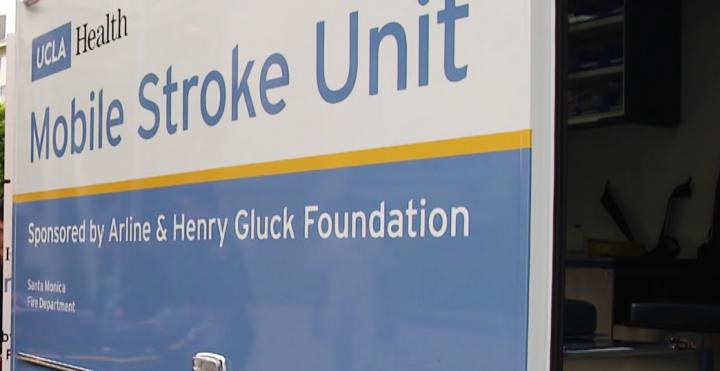Study finds mobile stroke units improve outcomes and lessen rates of disability in stroke patients.

Credit: UCLA Health
A new study involving UCLA researchers finds that mobile stroke units (MSUs) – state-of-the-art ambulances built to provide stroke patients with emergency neurological diagnosis and treatment prior to hospital arrival — improve patient outcomes and lessen the chance for disability by delivering care faster than standard stroke care.
The UCLA Mobile Stroke Unit serves as a shared regional resource of LA County EMS Provider Agencies, taking patients to 15 different stroke center hospitals within 3 regions in Los Angeles County. The MSU carries a CT scanner that can directly image the brain and blood vessels in the field. UCLA was one of seven national mobile stroke unit programs to participate in the clinical trial, which was presented March 17 at the International Stroke Conference.
Dr. May Nour, the UCLA MSU program’s medical director and a lead author on the study, said that she is very pleased that the study findings reflect the positive experience that she and her colleagues have been witnessing while treating patients in the field.
“Stroke is one of the golden-hour emergencies in which the swift timing of conclusive diagnosis and treatment dramatically impacts patient outcome and their chances of meaningful recovery,” Dr. Nour said. “We set out a few years ago to quantify the magnitude of benefit of mobile stroke unit pre-hospital care for our patients. We are proud to have participated in this pivotal trial. Today is a momentous day for the citizens of Los Angeles County.”
In October, Stephanie Wimberly, 40, of South Los Angeles, was at her dentist in Hawthorne when she experienced a stroke.
“I honestly believe that if it wasn’t for the UCLA Mobile Stroke Unit, I wouldn’t be alive today,” she said. “Dr. Nour saved my life.”
UCLA’s was the first mobile stroke unit launched in the California and in the western third of the United States. There are 20 mobile stroke unit sites throughout the United States. Clinical operations began in September of 2017 and have been supported by the Arline and Henry Gluck Foundation as well as Measure B funds from the Los Angeles County Board of Supervisors, which Supervisor Janice Hahn was instrumental in making available.
“The (UCLA) Mobile Stroke Unit is saving lives and preventing patients from experiencing debilitating brain damage after a stroke,” said Supervisor Hahn. “Mobile stroke units are the future of stroke treatment and I envision a day when we have enough of these units on the road to treat every stroke patient in LA County.”
The program currently provides hyper acute stroke care in the field for patients 6 days per week, 12 hours per day.
The study compared tissue plasminogen activator (tPA)-eligible patients managed by MSUs vs standard ambulance/emergency room care. It enrolled 1,517 patients with suspected acute ischemic stroke within 4.5 hours of experiencing symptoms. This included 617 patients in the MSU group and 430 in the standard care group who qualified for tPA. Of the tPA eligible patients, 97% received it in the MSU versus 80% with standard care.
Time from onset of symptoms until tPA treatment was shorter in the MSU group with a median time of 72 minutes versus 108 minutes in the standard treatment group. Thirty-three percent of MSU patients were treated within 60 minutes, compared to just 3% of SM patients.
The research concluded that the MSU patients had better outcomes and experienced much less disability, likely because the MSU patients received treatment faster.
“This convincing demonstration of the benefits of MSU care will support the incorporation of mobile stroke units into emergency medical systems throughout the country,” said Jeffrey Saver, MD, the director of the UCLA Comprehensive Stroke and Vascular Neurology Program. He added, “A new era in acute stroke has arrived.”
Research from UCLA has shown that 2 million brain cells are injured every minute in a stroke, supporting the American Heart/Stroke Association’s public message that, “Time lost is brain lost in acute stroke,” Dr. Saver said.
“The study results demonstrate that for every 100 patients treated with a mobile stroke unit rather than standard care later in the emergency department, 27 will have less final disability, including 11 more who will be disability free,” Dr. Nour added. “With these results, and keeping our patients and their families in the forefront of our minds, we are hopeful that this data provides initiative for expanding the mobile stroke unit pilot in our county to include a fleet of MSUs to serve all of the citizens of Los Angeles County in their greatest time of need.”
###
UCLA’s Mobile Stroke Unit is staffed by a vascular neurologist, either in person or by telemedicine, a firefighter paramedic, a critical care nurse and a CT technologist. After diagnosis, brain and life-saving therapies are delivered to the patients faster than ever before.
It currently operates in three geographic sites: the Western Site (Santa Monica, Beverly Hills, as well as patients transported from the Malibu to the city of Santa Monica), the Southern Site (Hawaiian Gardens, Signal Hill, Long Beach, Lakewood, La Mirada, Cerritos, Artesia, Bellflower, Paramount, unincorporated Whittier) and the most recently launched South Bay Site (Torrance, Hawthorne, Lawndale, Gardena, Carson, East Central LA, with future plans to include participating Beach City fire departments and Compton Fire).
Media Contact
Marrecca Fiore
[email protected]




